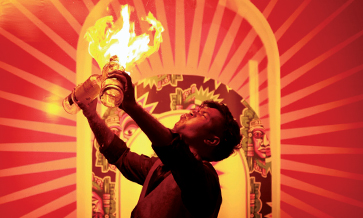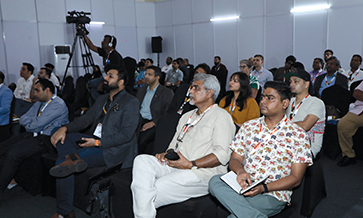Sibi Venktaraju initiated the discussion, saying the panellists would look at brands of Indian alcoholic beverages which, thanks to colonial intervention, were pushed aside to promote the Indian-made foreign liquor category.
“India has ignored traditional beverages to the point where we even banned arrack in some states,” he noted. “Feni is probably the only thing that’s in our minds today which has succeeded taking a reasonable position in the alcoholic beverages segment.”
Hansel noted that feni is indeed the original ‘Make in India’ story. Even in independent India, feni got categorised as country liquor. “Remember that the first recorded mention of feni was in 1584; so it’s really an old spirit, and we still produce it that way, in small batches,” he remarked.
According to him the biggest mistake every brand and category makes is “they think they know whiskey, they think they know the rules of vodka, they think they can play the game like gin – and then they try and use those rules to play their game”. Sibi Venktaraju initiated the discussion, saying the panellists would look at brands of Indian alcoholic beverages which, thanks to colonial intervention, were pushed aside to promote the Indian-made foreign liquor category.
“India has ignored traditional beverages to the point where we even banned arrack in some states,” he noted. “Feni is probably the only thing that’s in our minds today which has succeeded taking a reasonable position in the alcoholic beverages segment.”
Hansel noted that feni is indeed the original ‘Make in India’ story. Even in independent India, feni got categorised as country liquor. “Remember that the first recorded mention of feni was in 1584; so it’s really an old spirit, and we still produce it that way, in small batches,” he remarked.
According to him the biggest mistake every brand and category makes is “they think they know whiskey, they think they know the rules of vodka, they think they can play the game like gin – and then they try and use those rules to play their game”.
What are his best takeaways from the struggle for recognition and geographical indication (GI) tag? “For every indigenous spirit you need to have someone from your community to evangelise that spirit. You need to lobby with the government for recognition. Also, you have to take ownership of your own product if you really want to go forward,” Hansel replied.
Fruit & grains
As for Priyanka of Hill Zill Wines, her Fruzzante range of fruit wines comes from the coastal village of Bordi, near Mumbai. Chikoo (Sapota) has a GI tag of its own, a fact unknown to Priyanka until her graduation.
“I’m a fourth-generation farmer and I discovered that I could not process my own fruits! I fought single-handed for 7 years and 7 days with the government of Maharashtra just to let us process our own fruits. I think it is important that you have the conviction and persevere,” she recalled.
Devika and Khalil Bachooali, co-Founders of Adventurist Spirits, were rank outsiders when they were learning the ropes of gin-making in Europe. They were told to start with a extra-neutral alcohol made from wheat or barley. After researching more and visiting several distilleries, they hit upon the idea of using rice instead.
“We chanced upon this beautiful little distillery in Punjab that was making its neutral grain spirit from Basmati rice. This distillery in Gurdaspur was the only one of 17 others that had a sample from every single batch from the last 3 years! That told us that we were going to get a good, consistent product from these people,” Khalil recalls.
He added: “We didn’t choose rice just for the story of it, we chose rice because it was truly the best and most exceptional neutral grain spirit that we could find.”
More botanicals
It was very important from the beginning for Third Eye Distillery (Stranger&Sons) to embrace local ingredients because that’s what India is known for. “If you look globally, the spices that are used in gin are the ones that are exported from India, especially black pepper and Gondhoraj lemon,” said Charnelle Martins.
She works with farmer co-operatives, local vendors and research institutes to ensure quality and consistency. She recalled the amazing Perry Road Peru cocktail made from locally sourced guava as an example of cross-industry collaboration with Bombay Canteen restaurant.
The reason Stranger&Sons imports juniper berries from Macedonia is because it is very vibrant and citrusy. “Maybe in the future we would like to create another recipe with Indian juniper,” Charnelle said.
Khalil’s Tamras Indian Gin stresses on bringing out the magic of each individual distillate, from Nilgiri tea and mosambi (sweet lime) to grapefruit and foraged lotus seeds and flowers.
Priyanka sources the five different fruits – strawberry from Mahableshwar, pineapples from Vazhakulam (Kerala), oranges from Nagpur – because the quality of these ingredients is retained. “That makes your business more sustainable, because you are picking something local and saving on the cost of transportation over from long distances,” she added.
For the full panel discussion, visit Brews&Spirits Expo on YouTube.
https://www.youtube.com/watch?v=TunRVWx5Xe4&t=72s














